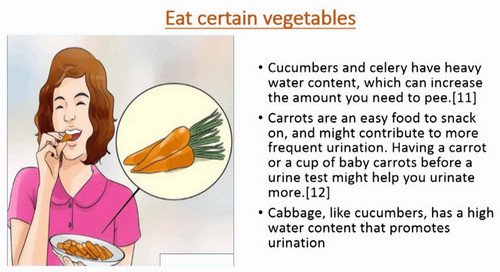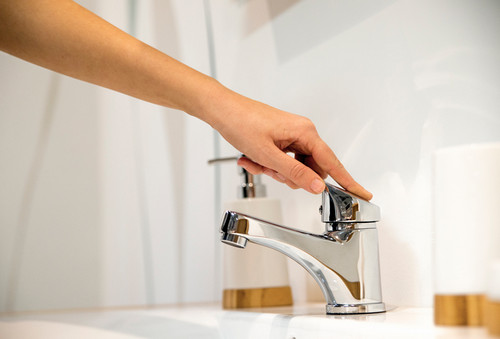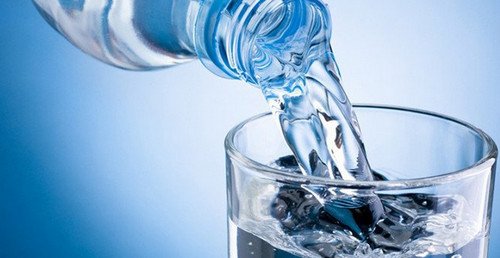How To Make Yourself Pee ?
Last reviewed by Dr. Raj MD on January 12th, 2022.
If you have trouble urinating, then you will most likely need to make yourself pee. It is necessary, especially if you need to give a urine sample of a test. Urine is stored in the bladder. If the bladder is full, the nerve system will send a signal to the brain alerting it the need to pee.
However, there are instances when you need to pee even if your bladder is not yet full such as in the case of a urine test/urinalysis. Other reasons/conditions that require to make yourself pee include the following:

Picture 1: Some food groups can help increase the urgency to urinate.
Image source: i.ytimg.com

Photo 2: Listening to the sound of running water can stimulate urination.
Picture Source: www.healthline.com

Image 3: Drinking plenty of fluids can help increase the urgency and frequency of urination.
Photo Source: www.languageofdesires.com
- Shy bladder – In the medical world, a shy bladder is called paruresis. It is a condition in which a person has a difficulty urinating in the presence of other people or if other people are just nearby. A shy bladder can have a huge impact on your day to day activities. If you have a trouble peeing in the bathroom of public places, you will most likely shy away from dates and social events. (1, 2, 3)
- Urinary tract infection – If you have a bladder infection, you will most likely have a hard time to pee. The infection causes malfunction of the bladder leading to painful and difficult urination. Some people have increase urgency to pee, but the urine output is very little.
- Enlarged prostate – If you have a benign prostatic hyperplasia, then most likely you will need to make yourself pee. People with BPH experienced increase urination, but the actual urination is painful and difficult. In fact, you will feel the need to strain to urinate because you feel like the bladder is not emptied completely. (3)
- Bladder obstruction – One of the reasons you are experiencing difficulty urinating is an obstructed bladder. For peeing to be possible, you need to relieve the blockage first. Possible reasons for obstructed bladder include an enlarged prostate, bladder stones, and bladder cancer.
- Side effects of medications – Some drugs can affect your ability to pass urine without difficulty. These include non-steroidal anti-inflammatory drugs and antidepressants.
- Neurologic disorders – You will most likely experience difficulty peeing if the nerves connected to your bladder are damaged. (5, 6)
- Constipation – A hardened stool in the colon can obstruct the bladder making it extremely difficult for you to pee. (5)
What can you do to make yourself pee?
Increase your fluid intake
One of the natural and safe ways to make yourself pee is by drinking plenty of fluids, especially water and natural fruit juices. The bladder will be full and in a few moment, you will feel the need to urinate.
Run the water
Get in the bathroom. Turn on the faucet and sit on the toilet. As much as possible, you should keep yourself relax, close your eyes, and focus on the sound of running water until you feel the urge to urinate. (6, 7)
Perineum rinse
The perineum is the area between the anus and genitalia. Gently rinse your perineal area with warm water while sitting on the toilet.
Exercise
Simple exercises like walking, jogging, and swimming can stimulate the bladder. Try to walk for a few minutes until such time you will feel the urge to urinate. (8)
Valsalva maneuver
While sitting on the toilet, you should gently press your lower abdomen. This causes pressure to the bladder making it feel the need to urinate. However, you need to make sure you do this technique the right way to prevent damage or infection to the kidneys. (9)
Eat certain types of foods
Some types of food have diuretic effects, which stimulates urination. Some of these foods are watermelons, cucumbers, carrots, and citrus foods. Watermelons are rich in water, which cleanse the kidneys and help flush out toxins from the body. Cucumbers are also high in water. They are a natural diuretic and have a cooling property. On the other hand, carrots are a natural source of antioxidants. Carrots help the body in removing free radicals. Citrusy fruits have diuretic properties. (8, 9)
Try the power of herbs
There are specific types of herbs that help you pee more. Examples of herbs that have a diuretic effect include parsley and ginger. Parsley acts as a natural diuretic. It improves the functions of the kidneys by removing excess water and salt. On the other hand, consuming a large amount of ginger can help you pee. In fact, if you drink ginger tea, you will feel relaxed.
After a few minutes, you will feel the urge to urinate. People who want to lose weight drink ginger tea because it reduces the possibility of fluid retention and promotes urination. Some people benefitted from taking cilantro. It has anti-inflammatory, antispasmodic, and diuretic properties. (4, 8, 10)
When should you call out for medical help?
Urinating problem should not be taken for granted. It can cause complications in the urinary tract leading to bladder infection and other types of debilitating health conditions. You should carefully assess yourself and be mindful on the sudden changes in the body.
You should immediately contact your health care provider if you are experiencing any of the following:
- Inability to pass urine
- Painful urination
- The urgency to urinate but the urine output is extremely little
- A feeling of urinating even if you just finished urinating
- A urine that comes in dribbles
- A scanty urine with blood
- If the urine appears cloudy
- If the urine has a foul odor
- If you feel a burning sensation when peeing (2, 4, 6, 7)
A urine is one of the body’s ways of excreting waste products from the body. If the bladder is not excreting the normal volume of urine on a day to day basis, then there could be some negative effects to the body.
If you are experiencing any of the symptoms mentioned above or have been trying hard to pee but remains unsuccessful, then you should call out for help. Do not try extreme measures to make yourself pee without consulting your doctor. (6, 7, 9)
References:
- http://www.healthyandnaturalworld.com/how-to-make-yourself-pee/
- https://www.healthline.com/health/how-to-make-yourself-pee
- https://www.wikihow.com/Make-Yourself-Pee
- https://www.scoopify.org/how-to-make-yourself-pee/
- https://www.languageofdesires.com/how-to-make-yourself-pee/
- https://healthfully.com/make-yourself-pee-faster-8394968.html
- http://www.shybladdersyndrome.org/shy-bladder-tips-that-help-to-defeat-the-syndrome/5-ways-to-help-you-overcome-shy-bladder-that-you-must-try/
- http://www.businessinsider.com/shortcut-18-secret-body-tricks-2011-2
- http://www.newhealthadvisor.com/How-to-Make-Yourself-Pee.html
- https://www.quora.com/What-are-some-ways-to-make-yourself-pee-more-to-lose-bloating